Tian Wen
Beyond Model Scale Limits: End-Edge-Cloud Federated Learning with Self-Rectified Knowledge Agglomeration
Jan 01, 2025



Abstract:The rise of End-Edge-Cloud Collaboration (EECC) offers a promising paradigm for Artificial Intelligence (AI) model training across end devices, edge servers, and cloud data centers, providing enhanced reliability and reduced latency. Hierarchical Federated Learning (HFL) can benefit from this paradigm by enabling multi-tier model aggregation across distributed computing nodes. However, the potential of HFL is significantly constrained by the inherent heterogeneity and dynamic characteristics of EECC environments. Specifically, the uniform model structure bounded by the least powerful end device across all computing nodes imposes a performance bottleneck. Meanwhile, coupled heterogeneity in data distributions and resource capabilities across tiers disrupts hierarchical knowledge transfer, leading to biased updates and degraded performance. Furthermore, the mobility and fluctuating connectivity of computing nodes in EECC environments introduce complexities in dynamic node migration, further compromising the robustness of the training process. To address multiple challenges within a unified framework, we propose End-Edge-Cloud Federated Learning with Self-Rectified Knowledge Agglomeration (FedEEC), which is a novel EECC-empowered FL framework that allows the trained models from end, edge, to cloud to grow larger in size and stronger in generalization ability. FedEEC introduces two key innovations: (1) Bridge Sample Based Online Distillation Protocol (BSBODP), which enables knowledge transfer between neighboring nodes through generated bridge samples, and (2) Self-Knowledge Rectification (SKR), which refines the transferred knowledge to prevent suboptimal cloud model optimization. The proposed framework effectively handles both cross-tier resource heterogeneity and effective knowledge transfer between neighboring nodes, while satisfying the migration-resilient requirements of EECC.
Peak-Controlled Logits Poisoning Attack in Federated Distillation
Jul 25, 2024Abstract:Federated Distillation (FD) offers an innovative approach to distributed machine learning, leveraging knowledge distillation for efficient and flexible cross-device knowledge transfer without necessitating the upload of extensive model parameters to a central server. While FD has gained popularity, its vulnerability to poisoning attacks remains underexplored. To address this gap, we previously introduced FDLA (Federated Distillation Logits Attack), a method that manipulates logits communication to mislead and degrade the performance of client models. However, the impact of FDLA on participants with different identities and the effects of malicious modifications at various stages of knowledge transfer remain unexplored. To this end, we present PCFDLA (Peak-Controlled Federated Distillation Logits Attack), an advanced and more stealthy logits poisoning attack method for FD. PCFDLA enhances the effectiveness of FDLA by carefully controlling the peak values of logits to create highly misleading yet inconspicuous modifications. Furthermore, we introduce a novel metric for better evaluating attack efficacy, demonstrating that PCFDLA maintains stealth while being significantly more disruptive to victim models compared to its predecessors. Experimental results across various datasets confirm the superior impact of PCFDLA on model accuracy, solidifying its potential threat in federated distillation systems.
Logits Poisoning Attack in Federated Distillation
Jan 08, 2024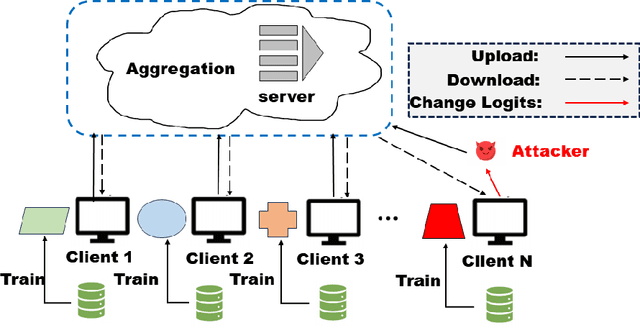


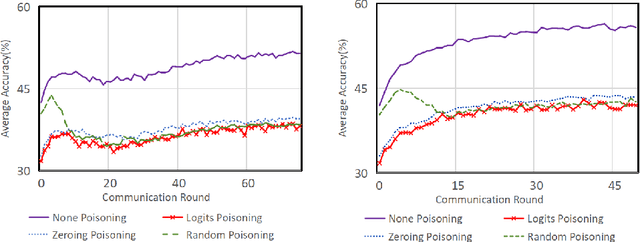
Abstract:Federated Distillation (FD) is a novel and promising distributed machine learning paradigm, where knowledge distillation is leveraged to facilitate a more efficient and flexible cross-device knowledge transfer in federated learning. By optimizing local models with knowledge distillation, FD circumvents the necessity of uploading large-scale model parameters to the central server, simultaneously preserving the raw data on local clients. Despite the growing popularity of FD, there is a noticeable gap in previous works concerning the exploration of poisoning attacks within this framework. This can lead to a scant understanding of the vulnerabilities to potential adversarial actions. To this end, we introduce FDLA, a poisoning attack method tailored for FD. FDLA manipulates logit communications in FD, aiming to significantly degrade model performance on clients through misleading the discrimination of private samples. Through extensive simulation experiments across a variety of datasets, attack scenarios, and FD configurations, we demonstrate that LPA effectively compromises client model accuracy, outperforming established baseline algorithms in this regard. Our findings underscore the critical need for robust defense mechanisms in FD settings to mitigate such adversarial threats.
Improving Communication Efficiency of Federated Distillation via Accumulating Local Updates
Dec 07, 2023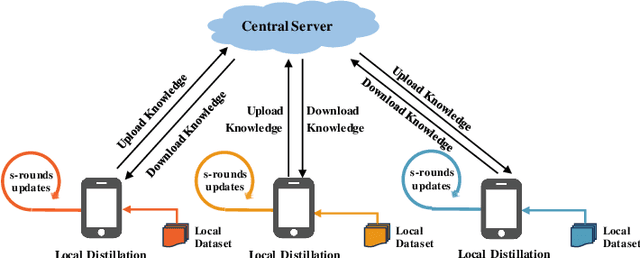
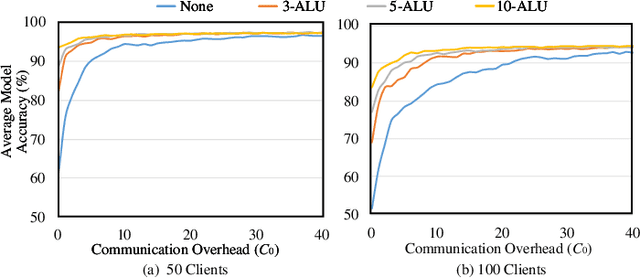
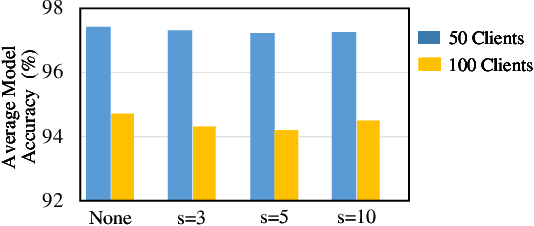
Abstract:As an emerging federated learning paradigm, federated distillation enables communication-efficient model training by transmitting only small-scale knowledge during the learning process. To further improve the communication efficiency of federated distillation, we propose a novel technique, ALU, which accumulates multiple rounds of local updates before transferring the knowledge to the central server. ALU drastically decreases the frequency of communication in federated distillation, thereby significantly reducing the communication overhead during the training process. Empirical experiments demonstrate the substantial effect of ALU in improving the communication efficiency of federated distillation.
 Add to Chrome
Add to Chrome Add to Firefox
Add to Firefox Add to Edge
Add to Edge